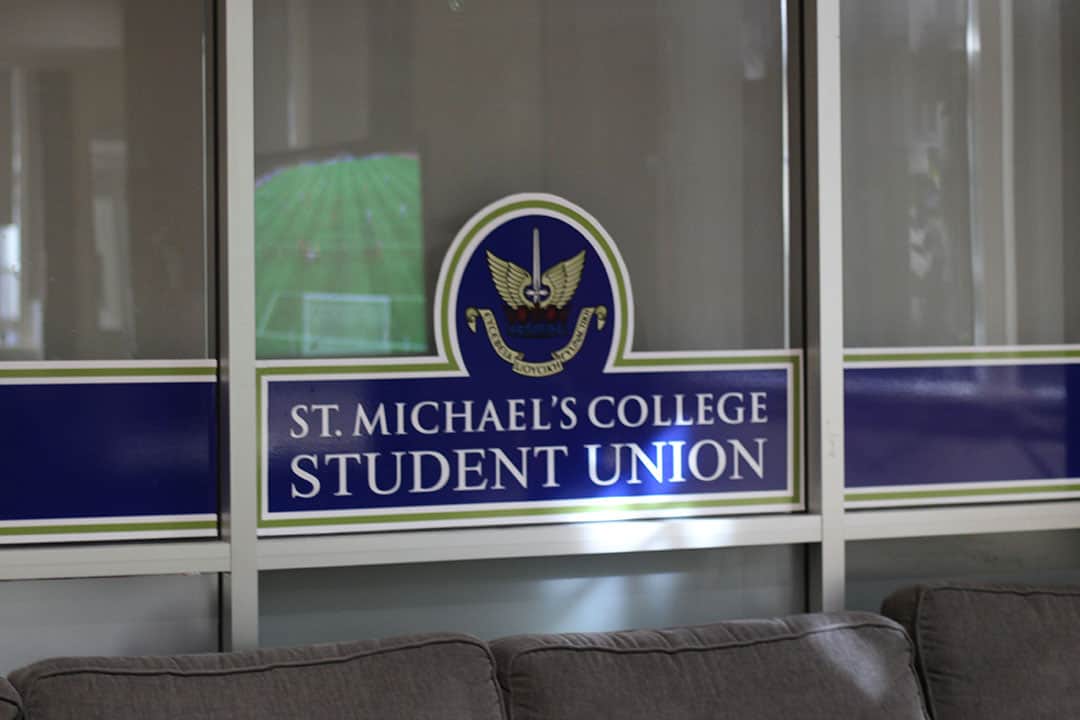After months of absence, the St. Michael’s College Student Union (SMCSU) is back. The controversy-ridden student government’s recent elections marked a crucial step for the St. Michael’s College (SMC) administration, whose plan to restructure the union has been in the works for some time.
On paper, the newly elected SMCSU executive shows promise. None of the elected members were affiliated with the old SMCSU, meaning they are free of its past scandals. At the candidates’ forum, many stressed the importance of rebuilding trust between students and the administration, creating a safe and inclusive environment for students to thrive in, and improving communication with the student community.
In reality, however, the elections reflected several fundamental issues that could pose problems for the new executive in the coming months.
With 410 online votes and two paper ballots cast out of approximately 4,800 SMC students, President Samantha Douek and her cohort of five Vice-Presidents (VP) will be representing the interests of only a small number of students for the 2017–2018 academic year. The low turnout rate of approximately 8.5 per cent is unsurprising: U of T’s electorate is well known for its apathy toward student elections.
What is more curious, though, is the absolute lack of competition for the SMCSU seats. Of the nine positions open for candidacy, only six were filled, given that no candidates ran for VP Finance, VP Religious and Community Affairs, or VP Athletics. Only three of the six positions filled — President, Vice-President, and VP Academic Affairs — were contested.
A lack of competition, combined with a low voter turnout rate, reflects how disillusioned the student community at SMC is with their student government. This could be attributed to years of neglect, mismanagement, and cliquey tendencies of past SMCSU executives, although it should be said that interventions from the SMC administration have also fermented great distrust on the legitimacy of student government at the college. The now-elected SMCSU might be a de jure student government but its actual legitimacy is weak.
Another troubling feature of the new SMCSU is its limited autonomy, particularly in terms of financial management. Whereas previous SMCSU governments could access their funds directly, the new rule, as decided by the college administration through its “Re-imaging Student Government at St Mike’s Report,” dictates that all payments over $500 must be co-signed by an Administrative Advisor. This rule could prevent the misuse of student funds, a well-intentioned move in light of the embezzlement and corruption that has taken place at the hands of past SMCSU executives, however it could also allow SMC to have indirect influence over the new executive.
Regulations like these are especially concerning given what has happened at the college over the past years. Furthermore, the SMC administration’s questionable stance on equity and the role that religion should play in college affairs — exemplified by events such as the ‘Golden Rule’ poster incident and the college’s subsidization of a pro-life rally in June — have raised eyebrows among SMC’s diverse student community.
The college administration’s heavy-handed involvement in restructuring SMCSU might have deterred most students to run for office, explaining how a college of almost 5,000 students was unable to fill nine executive roles. This failure would also support dissenting students in accusing the new SMCSU of being a puppet regime, incapable of representing student voices.
All of these factors threaten to transform SMC into one college with two systems: one of governance through the administration, and the other by influence through SMCSU.
Autonomy is important for student governments. With space to breathe, student unions can be run effectively, and their actions and policies can help shape and uphold students’ rights. In the case of SMC, the right amount of constraints and balances could foster a positive student community that all sides could work on. Yet the restraints imposed upon the new executive and the lacklustre nature of the elections have shown this to be unlikely.
SMCSU might have been cleansed of its tainted legacy, but its reformed structure is a hollow shell of its former self. Devoid of full autonomy and proper legitimacy, the new executive will face a steep learning curve in the months to come. It is important that executives keep themselves accountable to students and at the same time find ways to regain their autonomy.
Arnold Yung is a fourth-year student at St. Michael’s College studying History. Previously, he served as a Communications Councillor on the SMC Residence Council and as a Leader and Marshal for SMC Orientation Week.


